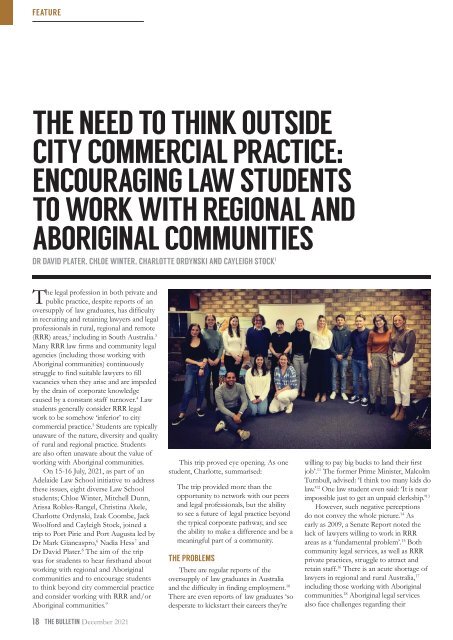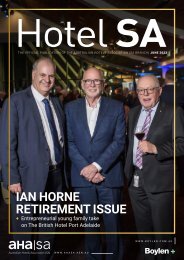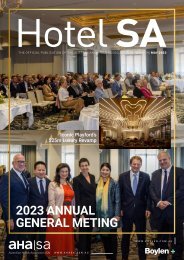LSB December 2021 HR
Create successful ePaper yourself
Turn your PDF publications into a flip-book with our unique Google optimized e-Paper software.
FEATURE<br />
THE NEED TO THINK OUTSIDE<br />
CITY COMMERCIAL PRACTICE:<br />
ENCOURAGING LAW STUDENTS<br />
TO WORK WITH REGIONAL AND<br />
ABORIGINAL COMMUNITIES<br />
DR DAVID PLATER, CHLOE WINTER, CHARLOTTE ORDYNSKI AND CAYLEIGH STOCK 1<br />
The legal profession in both private and<br />
public practice, despite reports of an<br />
oversupply of law graduates, has difficulty<br />
in recruiting and retaining lawyers and legal<br />
professionals in rural, regional and remote<br />
(RRR) areas, 2 including in South Australia. 3<br />
Many RRR law firms and community legal<br />
agencies (including those working with<br />
Aboriginal communities) continuously<br />
struggle to find suitable lawyers to fill<br />
vacancies when they arise and are impeded<br />
by the drain of corporate knowledge<br />
caused by a constant staff turnover. 4 Law<br />
students generally consider RRR legal<br />
work to be somehow ‘inferior’ to city<br />
commercial practice. 5 Students are typically<br />
unaware of the nature, diversity and quality<br />
of rural and regional practice. Students<br />
are also often unaware about the value of<br />
working with Aboriginal communities.<br />
On 15-16 July, <strong>2021</strong>, as part of an<br />
Adelaide Law School initiative to address<br />
these issues, eight diverse Law School<br />
students; Chloe Winter, Mitchell Dunn,<br />
Arissa Robles-Rangel, Christina Akele,<br />
Charlotte Ordynski, Izak Coombe, Jack<br />
Woolford and Cayleigh Stock, joined a<br />
trip to Port Pirie and Port Augusta led by<br />
Dr Mark Giancaspro, 6 Nadia Hess 7 and<br />
Dr David Plater. 8 The aim of the trip<br />
was for students to hear firsthand about<br />
working with regional and Aboriginal<br />
communities and to encourage students<br />
to think beyond city commercial practice<br />
and consider working with RRR and/or<br />
Aboriginal communities. 9<br />
This trip proved eye opening. As one<br />
student, Charlotte, summarised:<br />
The trip provided more than the<br />
opportunity to network with our peers<br />
and legal professionals, but the ability<br />
to see a future of legal practice beyond<br />
the typical corporate pathway, and see<br />
the ability to make a difference and be a<br />
meaningful part of a community.<br />
THE PROBLEMS<br />
There are regular reports of the<br />
oversupply of law graduates in Australia<br />
and the difficulty in finding employment. 10<br />
There are even reports of law graduates ‘so<br />
desperate to kickstart their careers they’re<br />
willing to pay big bucks to land their first<br />
job’. 11 The former Prime Minister, Malcolm<br />
Turnbull, advised: ‘I think too many kids do<br />
law.’ 12 One law student even said: ‘It is near<br />
impossible just to get an unpaid clerkship.’ 13<br />
However, such negative perceptions<br />
do not convey the whole picture. 14 As<br />
early as 2009, a Senate Report noted the<br />
lack of lawyers willing to work in RRR<br />
areas as a ‘fundamental problem’. 15 Both<br />
community legal services, as well as RRR<br />
private practices, struggle to attract and<br />
retain staff. 16 There is an acute shortage of<br />
lawyers in regional and rural Australia, 17<br />
including those working with Aboriginal<br />
communities. 18 Aboriginal legal services<br />
also face challenges regarding their<br />
18<br />
THE BULLETIN <strong>December</strong> <strong>2021</strong>


















